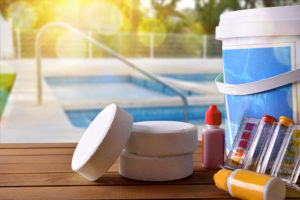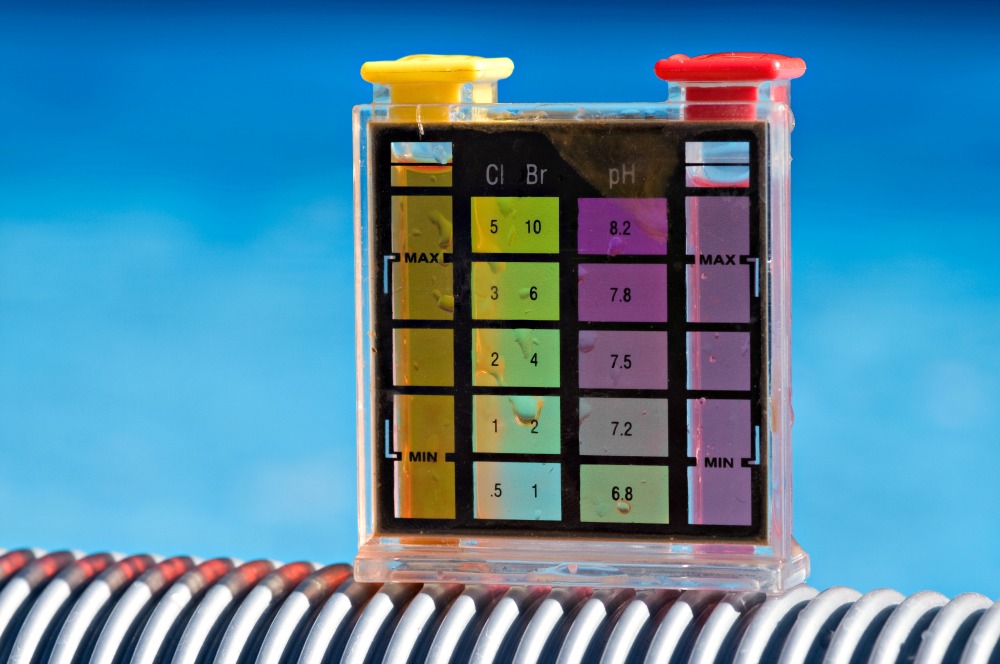A lot of our clients use chemicals as a surefire way of cleansing their backyard pools. The other half takes a more natural approach—a healthy alternative for the environment. As a result, our team is often asked about alternatives to chemicals to find a happy medium. Remember: even saline pools use chemicals, only it’s a lesser amount. Today, we’re discussing alternatives to pool chemicals including the pros and cons of each.
Salt Water
Our bodies ingest salt and sweat salt. Therefore, salt is a key element of our diet and our body composition. Wouldn’t it make sense to soak in a pool that is more closely aligned with our bodies? This is one of the major alternatives to pool chemicals. Salt water pool systems use salt to create chlorine, but without harsh molecules known as chloramines. These chemicals are what are associated with the intense smell and dried feeling of our skin. Not only is salt a chemical alternative, there are many testimonials that speak to a reduction in cost of ownership as well.
First Round Of Pool Chemicals: Ozone / Ozonators
Ozone, or O3, is a blue gas that is generated in a pool system to break down the organic bacteria as a result of human use. This is the everyday bacteria, good and bad, found in our body oils, sunscreen, lotion, urine and so on. The gas won’t clean your pool water by itself. However, it’s used in conjunction with chlorine and overall, less chlorine is needed. This is more of a tweak, rather than a full-blown alternative. Use of chlorine would be more necessary in humid climates. If you live in a dry climate, we feel ozonators would be worth considering.
Ionizers
Mineral pools are the types that use an ionizer system. Rather than adding chemicals into the water, then filtering the water, an ionizer will charge and send copper and silver into the water. Copper kills the algae and silver cleanses the water. The positive charge attracts bacteria which “clump together” essentially. Those larger compounds are carried into the filtration system and removed from the pool water.
Non-Chlorine Shock
We feel a non-chlorine shock would be a small enhancement or tweak as well. This is because chlorine is still need to complete the sanitation method. Adding oxygen (oxidizing) the organic substances (everyday bacteria) keeps the chloramine levels low which allows chlorine to do its job. Just like with Bromine, which we’ll cover shortly, this is a great option for indoor pools. UV rays from the sunlight oxidize those organic bacterial compounds naturally, therefore a non-chlorine shock would benefit indoor pool owners.
Bromine
If you have a pool and/or a spa, Bromine can be an alternative, which saves you time. If you or your family have health concerns, bromine can be a substitute altogether. Although a little more costly, Bromine maintains the pH balance longer than chlorine. However, more bromine is needed as opposed to chlorine because the chemicals breakdown as a result of direct sunlight. Perhaps if you have an indoor pool and don’t need to worry about sunlight breaking down the chemicals, bromine is an option in your inventory. Keep in mind, this is also an alternative to anyone with a chlorine allergy.
Baqua / Baquanide
Baqua is a compound that is considered to be most hands-off when it comes to pool maintenance. Like all things, there are pros and cons. The pros to Baquanide are big. It doesn’t cause irritation to the eyes or skin. It’s not vulnerable to sunlight exposure and therefore, it won’t break down. pH levels won’t need to be monitored as they would with a chlorine system either. Yes, your pool still needs to be shocked, but maintenance is less expensive. The Baquanide products themselves can be expensive. Reports from previous users say problems arise after extended use such as mold in the water and cloudy water. Now, the only way to get rid of those issues is a complete drain and refill. Why did this make our list? It’s a worthy option for smaller applications like a spa, which can more easily be drained and refilled.
Feel free to reach out to us if you have questions! Our team is available to discuss any topics regarding your pool.
REFERENCES:
- https://www.houselogic.com/by-room/yard-patio/swimming-pools-alternatives-chlorine/
- https://www.swimuniversity.com/exploring-alternatives-chlorine-pool/
- http://www.poolsupplyworld.com/blog/five-chlorine-alternatives-pool-owners/
Erik’s Aquatic Care is always here to answer questions you may have as a current or future pool owner. Cheers!

